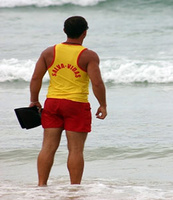Brazil shark attacks explained
 A certain amount of alarm is justifiable when shark attacks are mentioned, particularly if they occur in the location where you have just bought your dream property. The International Property Investment Network (IPIN) puts the latest information provided by the BBC on Recife firmly into perspective.
A certain amount of alarm is justifiable when shark attacks are mentioned, particularly if they occur in the location where you have just bought your dream property. The International Property Investment Network (IPIN) puts the latest information provided by the BBC on Recife firmly into perspective.In real terms, there are more shark attacks in Florida and Australia than there are in Brazil, yet the Brazilian authorities are of course acting upon the issue. Fifty years ago, shark attacks were unheard of in Recife. However, following the construction of the Port Saupe in 1984, an industrial area an hour south of Recife, shark attacks have indeed increased in the area.
International experts such as Dr.Dan Huber have visited Recife and have come to the conclusion that it is bull sharks and perhaps one tiger shark that are causing the attacks.
Likewise, the Brazilian government conducted an International Shark Attack Workshop, bringing together doctors from Pemambuco Rural University, 16 local participants representing various universities, natural resource and beach safety agencies, and state/local government, plus five invited national and foreign scientists. The Workshop was characterized by excellent cooperation between local and foreign scientists, local government, and affected user groups. The scientists discovered that the attacks occurred at five beaches in the Recife area in all months except April, May and June. Shark attacks seem to have been associated with strong south and south-easterly winds, turbid water conditions, and new and full moon periods when higher tides may have facilitated shark movements into near shore waters.
Researchers focused on solutions to keep sharks and people away from each other at observed “hot spots” and the Brazilian government has complied with many of the suggestions: surfing is no longer legal in the high risk areas, neither is swimming beyond the reef line. Since this ban was implemented, the only attacks that have occurred involved surfers illegally surfing in the high risk area.
If all recommended measures are enacted, shark attacks may be expected to decrease by at least 80%. More of these preventative measures include improved training and equipment for lifeguards and emergency personnel as well as public education programmes. A socio-economic working group has also been established to assess the importance of near shore shrimp fishing to the community.
The concept of sustainable ecological development is one which the Brazilian government and ministry of tourism are proud of and are working hard to maintain. Strict regulations are in place to ensure new resort areas do not unduly destroy the natural environment in which they are set. A good example of this can be observed at the Turtle Bay Beach Resort in Bahia, where beach plots are available to investors at excellent prices and with high returns. Although the resort will encompass all the luxuries and comforts in demand by international visitors, villas can only be built to a maximum height of ground floor and first floor, with the absolute beach front properties only having permission to build on one level. Set in an exotic environment, the concept of the resort is based around perfect harmony with its natural environment, utilizing environmentally conscious building materials and implementing low-density development while incorporating natural lagoons, an ecological drainage system and water recycling.
Numbers of international and domestic tourists in Brazil are on the rise. Coupled with the government’s commitment to ensuring positive foreign investment in the region, the situation is already under control.
For further information, visit propertyshowrooms.com.

